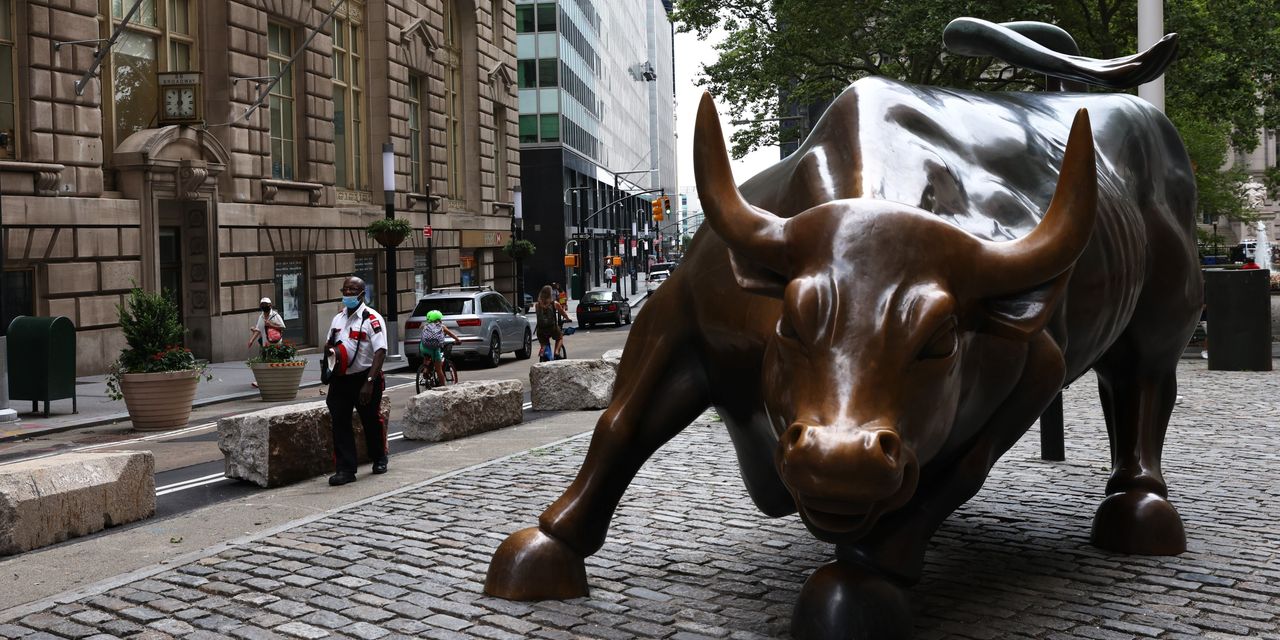
U.S. stock benchmarks rose Friday afternoon, with the S&P 500 and Nasdaq Composite pushing toward a close in record territory, staging a recovery from the previous session that was marked by doubts about the global economic recovery from the pandemic.
What are major indexes doing?
- The Dow Jones Industrial Average DJIA, +1.29% rose 426 points, or 1.2%, to 34,848.
- The S&P 500 SPX, +1.08% traded up almost 44 points, or 1%, at 4,364, putting the broad-market benchmark in record-close territory, powered by a 2.6% gain in financials XLF, +2.73%, and a 1.8% rise in materials XLB, +1.93%.
- The Nasdaq Composite Index COMP, +0.92% added 127 points, or 0.9%, to trade in record-closing higher territory at about 14,687.
- The small-capitalization Russell 2000 index RUT, +1.99% was gaining 1.9%.
On Thursday, stocks retreated but ended the day off session lows. The Dow closed 259.86 points lower, off 0.7%, at 34,421.93, after dropping more than 500 points at its session low. The S&P 500 ended 0.9% lower, while the Nasdaq Composite gave up 0.7% a day after both indexes closed at their latest in a string of records.
Weekly stats
The Dow and S&P 500 were on track for weekly gains of about 0.2% and 0.3%, respectively. The Nasdaq was looking at a weekly rise of about 0.3%, after starting Friday trade on track for a weekly decline of 0.3%. Gains for all three benchmarks would mark their third straight. Meanwhile, the Russell 2000 was headed for a 1.4% weekly decline, its second in a row.
What’s driving the market?
Bullishness was back in force on Wall Street Friday afternoon.
The stock market was staging an impressive comeback after equities slumped Thursday on worries over the global growth outlook as some countries struggle with the coronavirus pandemic. The concerns about the pandemic were blamed — along with myriad other factors — for a U.S. Treasury debt rally that sent long-term yields down to their lowest levels since February this week.
Yields were edging back up Friday though, with the 10-year U.S. Treasury yield TMUBMUSD10Y, 1.351% up 5.1 basis points at 1.349%. The yield hit a five-month low below 1.25% on Thursday.
It’s “this battle between the rise of the delta variant versus the rise of the earnings season,” said Jeff Kleintop, chief global investment strategist at Charles Schwab, in a phone interview Friday. The corporate earnings reporting season is about to begin next week, he said, leaving investors to weigh guidance on growth against concerns the spread of the delta variant of Covid-19 could hold back, or reverse, economic reopenings globally.
Some investors and strategists caution that the upswing for stocks belies concerns that are running beneath the surface.
“I believe the market has been, and continues to be, confused. It can’t seem to decide if it wants bad economic news which means more easy money, but also potentially more inflation; or if it wants good economic news which means Fed tapering sooner rather than later, but also potentially flatter markets, tighter credit and weaker earnings,” Randy Frederick, vice president of trading and derivatives with the Schwab Center for Financial Research, told MarketWatch.
“I expect this battle to continue until earnings season picks up and provides a needed distraction,” he said.
Companies in the S&P 500 index are expected to see a 63.6% increase in earnings in the second quarter from a year before, which would mark the biggest 12-month climb since the fourth quarter of 2009, according to FactSet analysts.
In One Chart: Get ready for peak earnings growth as second-quarter results kick off next week
Meanwhile, coronavirus-related restrictions were tightened in Asia and Europe. Seoul’s pandemic alert was lifted to its highest level, the Netherlands announced new steps and social-distancing rules were tightened in Sydney, a day after Japan declared a state of emergency that will effectively rule out spectators at the 2020 Olympics.
While concerns about the spread of the delta variant of the coronavirus that causes COVID-19 were cited as part of the reason behind the worries over the global economic outlook, some analysts questioned whether the struggle with the pandemic in some Asian and emerging market countries in particular would be enough to derail the global equity market rally.
Read: Why did the stock market sell off? Falling bond yields point to ‘growth scare’
In the end, falling yields should be a positive for stocks, argued Ipek Ozkardeskaya, senior analyst at Swissquote, in a Friday note. Falling yields hint that inflation and the potential for a more aggressive than expected withdrawal of easy money policies by the Federal Reserve are a fading cause for concern, she said.
“The market rhetoric is clearly shifting from transitory inflation to transitory recovery, and that’s probably what keeps the inflows in U.S. Treasurys elevated, combined with a seasonally low issuance of Treasurys in July and the Fed coming back to the market after the July 4 break,” the analyst said.
“ As such, falling Treasury yields and rising equity prices is the most reasonable market reaction, although it’s worth noting that this time, the rising COVID concerns are also accompanied by rising COVID cases,” Ozkardeskaya wrote.
Meanwhile, the Biden administration on Friday announced a new executive order to crack down on anticompetitive practices in the technology sector in particular. The order includes 72 actions and recommendations across a dozen federal agencies.
Elsewhere in the world, the People’s Bank of China announced Friday it was cutting reserve requirements for its banks to help bolster the world’s number-two economy. The PBOC said, effective July 15, that reserve requirement ratio, or RRR, would be lowered by a half point, to a weighted average of 8.9%.
In economic news, U.S. wholesale inventories climbed 1.3% in May, compared with 1.1% that had been expected by economists on average, suggesting that inventories remain tight amid supply-chain bottlenecks and amplified demand in the rebound from the pandemic.
“We know businesses have been worried about very low inventory levels,” said Kleintop. But the “inventory-to-sales ratio went up a little,” suggesting a bit of improvement in companies getting the supplies they need, he said. While still “a fairly low ratio,” he said, “it’s not as bad as it was in March or in April.”
See: U.S. inventory-to-sales ratio at record low in March
With inflationary pressures appearing to ease, said Kleintop, “I’m becoming less concerned that the Fed might have to do something aggressive.”
Which companies are in focus?
- Philip Morris International Inc. PM, +1.30% announced plans to buy Vectura Group PLC, a U.K. pharmaceuticals business specializing in inhaled medicines, for $1.24 billion in cash, part of its push to expand beyond tobacco and nicotine. Philip Morris shares was up 1.1% in Friday afternoon trading.
- Shares of Levi Strauss & Co. LEVI, +1.45% after the jeans company late Thursday announced results that topped Wall Street estimates and raised its forecast for the year. Its stock was up 2.1%.
- Stripe has hired Cleary Gottlieb Steen & Hamilton LLP to advise it on planning for an initial public offering, according to a report from Reuters Friday.
- Shares of United Airlines Holdings Inc. UAL were in focus on Friday, after the air carrier is taking advantage of the “resurgence” in travel as the recovery from the COVID-19 pandemic continues, by saying it was adding nearly 150 flights to warm-weather cities in the U.S., and boosting service to Mexico, the Caribbean and Central America. United Airlines stock was up 2.8%.
- Altria Group Inc. MO said Friday it has agreed to sell its Ste. Michelle Wine Estates business to private-equity firm Sycamore Partners Management LP for about $1.2 billion in cash. Shares of Altria rose 1.7%.
- The Food and Drug Administration and the Center for Disease Control on Thursday said there isn’t scientific evidence that COVID-19 booster shots are required, hours after drugmaker Pfizer PFE said it would seek authorization for a Covid booster shot to help contain the Delta variant. Pfizer shares were up 1.1%
- Stamps.com Inc. STMP announced Friday an agreement to be acquired by software investment firm Thoma Bravo in a cash deal that values the web-based mailing and shipping services company at $6.6 billion. Shares soared almost 64%.
How are other assets faring?
- The ICE U.S. Dollar Index DXY, a measure of the currency against six major rivals, was down 0.3%.
- Oil futures headed sharply higher on Friday, with the U.S. benchmark CL00 advancing 2.1% to trade at $74.45 a barrel. Gold GC00 settled 0.6% higher at $1,810.60 an ounce.
- European equities rebounded after Thursday’s declines, with the Stoxx Europe 600 SXXP rising 1.3% and putting in a weekly gain of 0.2% and London’s FTSE 100 UKX also closing about 1.3% higher to notch a weekly loss of 0.02%.
- In Asia, the Shanghai Composite SHCOMP slipped less than 0.1% and booked a weekly advance of 0.2%, Hong Kong’s Hang Seng Index HSI rose 0.7% on the session but finished 3.4% lower on the week and Japan’s Nikkei 225 NIK dropped 0.6% in Friday action, contributing to a 2.9% weekly slump.
—William Watts contributed to this report.





